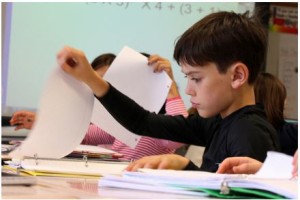 Organizational skills is another aspect of executive functioning and refers to how a person processes information and “stores” it in his or her brain. Neural Mechanisms in the brain work to store information as short term or long term memory, but organization refers to the more effortful (not automatic) process of organizing how we think about things and approach problem solving. When speaking about cognitive organization, the term “schema” is helpful to use. A person has many, many different schemas for the various knowledge and information they process. One’s schema also accounts for how we see the world and new experiences around us. Our schemas grow and become more complex as we age, and allow us to learn new things and/or simplify the world around us.
Organizational skills is another aspect of executive functioning and refers to how a person processes information and “stores” it in his or her brain. Neural Mechanisms in the brain work to store information as short term or long term memory, but organization refers to the more effortful (not automatic) process of organizing how we think about things and approach problem solving. When speaking about cognitive organization, the term “schema” is helpful to use. A person has many, many different schemas for the various knowledge and information they process. One’s schema also accounts for how we see the world and new experiences around us. Our schemas grow and become more complex as we age, and allow us to learn new things and/or simplify the world around us.
Cognitive organization can work in two directions: categorizing within what we already know, or adding new categories. Both are adaptive processes that help us relate to the world, and we do both throughout our life. For example, when a child learns that dogs and cows (both fuzzy animals with four legs) are two different animals, that child is expanding his or her schema and organizing that information. When a high school student goes off to college, he or she applies the existing schema from high school to adapt to the new environment (and will eventually form a new schema specific to college life).
A child who has difficulties with cognitive organization may have trouble synthesizing new, old, and incoming information within their schemas. Younger children who have difficulty with cognitive organization may have trouble putting things into categories, may play in an unorganized manner and shift quickly between activities, and may have trouble vocalizing their thoughts and emotions. Older children who have difficulty with cognitive organization may have trouble writing essays, studying for large comprehensive exams, and speaking about their experiences or telling long stories.
Organization is one of the eleven “executive skills” identified by Dawson and Guare and is identified as an executive function in many theories, including those by Pennington and Ozonoff (1996), where it is described as a “self-regulatory function” for organization, by Mangeot et al. (2002) as “organizational skills”, and by Gioia, Isquith, and Guy (2001) as “essential for the synthesis of external stimuli.”
Neuropsychological assessments that examine organization include the Rey-Osterrieth Complex Figure Test and the Bender II. Other helpful tests of organization include the Beery-Buktenica Developmental Test of Visual-Motor Integration for visual organization and projective storytelling tests such as the Roberts Apperception Test and the Thematic Apperception Test for verbal organization.
There are a number of rating scales that assess one’s organization as well. Organization is assessed in the Barkley Deficits of Executive Functioning Scale on the Self Organization/Problem solving items. On the Behavior Rating Inventory for Executive Functions, it is measured on the Organizational/Materials subscale. On the Brown ADD Scale it is assessed on the Organizing, Prioritizing, and Activating to Work scale.
For More Information on Organization, Please Visit the Following Links
LearningWorks For Kids: The premier resource for executive function information, offering a detailed explanation of organization, tips for parents, and activities to improve this skill.
Coordinated Campaign for Learning Disabilities: A list of general tips to help children improve their daily organizational skills.
Scholastic: This site provides 12 different ways they can better their child’s organization skills.
National Association for Gifted Children: This site focuses on academic organization and provides a list of links to other valuable organization-building sites.
Photo Credit: woodleywonderworks / CC BY 2.0
Receive online class information and helpful tips from Dr. Randy Kulman's LearningWorks for Kids |




